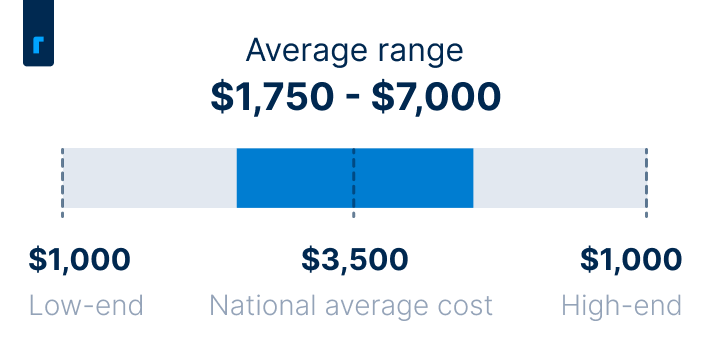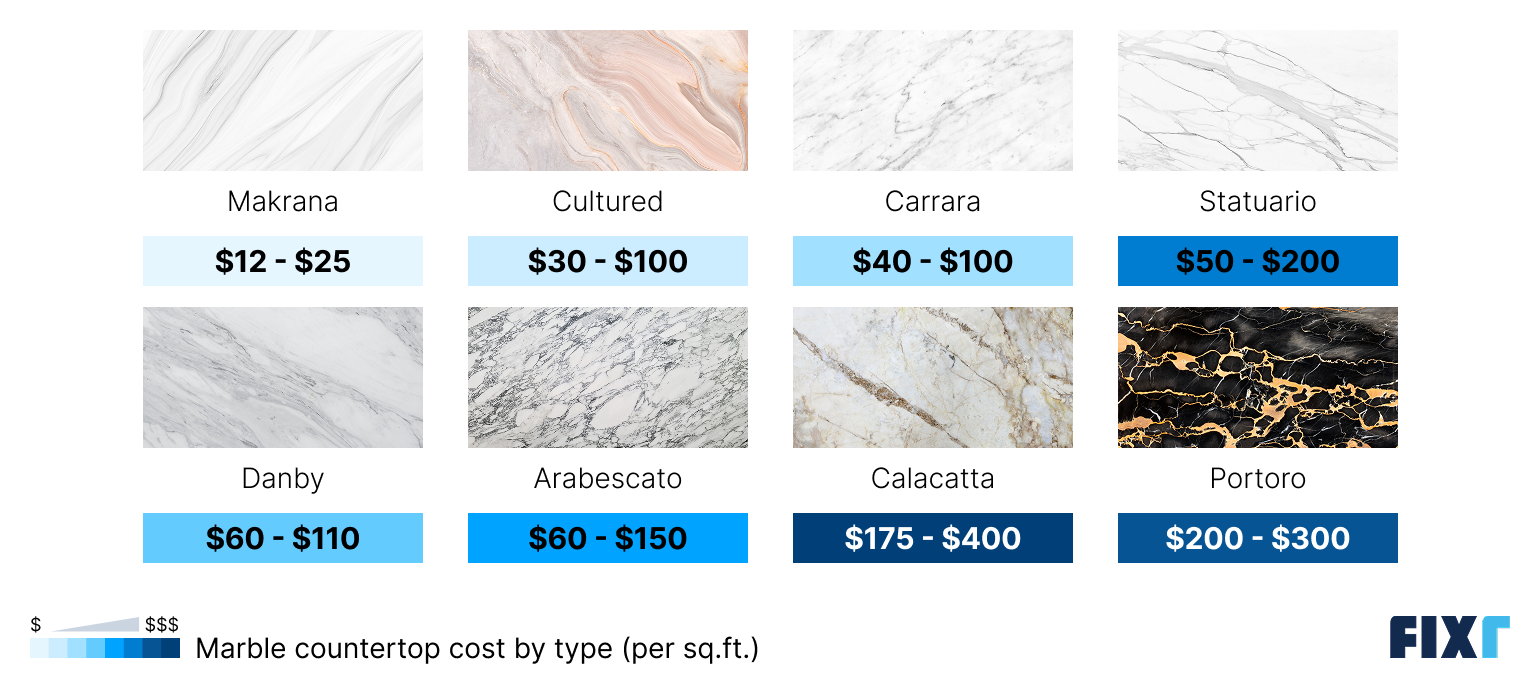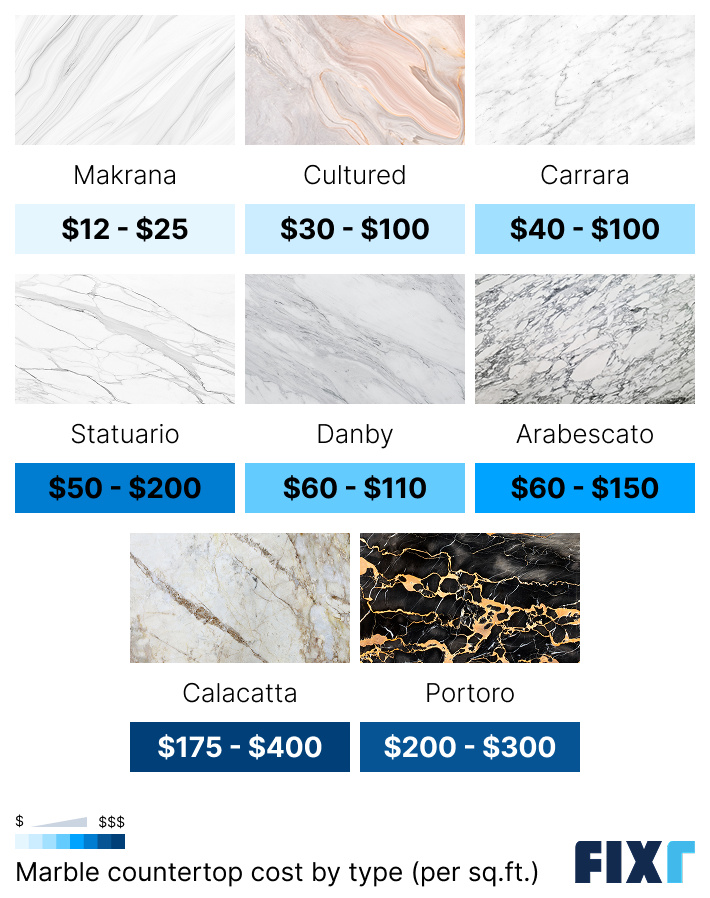Updated: January 27, 2026
Written by Dan Simms
Nieves Martinez is a writer and editor at Fixr.com, specializing in home improvement and construction content. With over five years of experience and a Master's degree in Digital Marketing, she collaborates with industry professionals to create clear, carefully reviewed cost guides and renovation resources that help homeowners make informed remodeling decisions.
Learn moreReviewed by Nieves Martinez
Marble countertops cost an average of $3,500 to install in an average kitchen with 35 square feet of countertop, and most homeowners pay somewhere between $1,750 and $7,000. Your price can vary based on many different factors, including the size and layout of your kitchen, the complexity of the countertop design, the edge profile you want, and the quality, color, and veining of the marble you choose.
If you’re looking for an elegant countertop material to bring a touch of opulence to your kitchen or bathroom, you can’t beat the high-end look of marble. Marble countertops scream luxury and can instantly elevate a room. They also offer more than beauty, as marble is a natural and relatively sustainable material, it stands up well to scratches and wear, it is heat resistant, and it can last a lifetime if properly cared for.
Average Cost of Marble Countertops


Marble Countertops Cost per Square Foot
Marble countertops cost an average of around $100 per square foot, including materials and labor. Prices typically range from $50 up to $200 per square foot, depending on the quality, thickness, design, and layout.
The average kitchen has between 30 and 40 square feet of countertop, and the average bathroom has between 6 and 10 square feet of countertop. You can use these averages and the typical cost per square foot to get a good idea of where your total will fall.
Countertop Size (Sq.Ft.) | Average Cost Range (Installed) |
10 | $500 - $2,000 |
20 | $1,000 - $4,000 |
30 | $1,500 - $6,000 |
35 | $1,750 - $7,000 |
40 | $2,000 - $8,000 |
For homeowners on a budget, marble tiles are a great alternative to slabs. While they're often used for flooring and backsplashes, tiles can also be used to create a stunning marble countertop for a fraction of the cost. Since they don't require the mining of large chunks of stone, you can find them for as little as $7 per square foot for materials.
Factors That Influence the Cost of Marble Countertops
There are two primary factors you need to consider when estimating your marble countertop costs: the type of marble you want, and the quality of the material. Together, these factors will largely determine your total costs.
Marble Countertops Cost by Type
There are also many different types of marble, which are differentiated by their origin, coloring, vein patterns, rarity, natural beauty, and cost. Carrara marble is one of the most popular types of marble. Carrara marble countertops cost between $70 and $100 per square foot, and the affordability is a big reason for its popularity. Makrana marble comes from India and is even more budget-friendly, but it’s generally less desirable.
Other popular marble types from Italy, which is known for high-quality marble, include Calacatta marble, Statuario, and Arabescato. Danby marble comes from Vermont, so some homeowners choose this option to support domestic manufacturers. Cultured marble is a human-made product that offers a mimicked appearance but isn’t genuine marble.


Marble Type | Average Cost per Sq. Ft. (Materials Only) |
Makrana | $12 – $25 |
Cultured | $30 – $100 |
Carrara | $40 – $100 |
Statuario | $50 – $200 |
Danby | $60 – $110 |
Arabescato | $60 – $150 |
Calacatta | $175 – $400 |
Portoro | $200 – $300 |
Marble Countertop Grade
Marble slabs are classified by grade, which provides information about the quality and flaws of the product. Since marble is a natural material, it will never be “perfect,” and the grade tells you how many imperfections are present.
There are four grades for marble slabs: A, B, C, and D.
Grade A: This is considered premium quality marble. Grade A marble has virtually no noticeable imperfections and minimal, regular veining. Due to its high quality, it’s the most expensive.
Grade B: Slabs in this category are still of good quality but may have minor imperfections, such as slight inconsistencies in color or small pits that are not easily visible.
Grade C: Once you get to grade C, the repairs for the minor imperfections might become noticeable. The veining is often more pronounced, and the slab may have cracks or pits that require filling during the fabrication process.
Grade D: This is the most affordable but lowest quality grade. It typically has significant flaws, inconsistent coloring, and prominent, irregular veining. These slabs often require substantial repair and are best suited for projects with lower visibility.
Marble Countertop Installation Cost
On average, you can expect to pay between $10 and $30 per square foot of marble countertop you want installed for labor alone. This is just an average number, though, as most contractors will charge by time, with rates ranging from $35 to $45 per hour. You’ll pay less to install marble countertops in a new kitchen, as you won’t need to pay to have your contractor break up the old countertop and haul it away.
Labor costs can vary widely based on many factors. The cost of living in your area can affect your costs per hour, and anything that makes the job more difficult or more time-consuming will also drive installation costs higher, including the following:
Requiring your pros to maneuver the slab up or down stairs or around tight corners.
Requiring multiple cutouts for sinks, soap dispensers, and faucets.
Requesting seam matching for veining where different slabs come together.
Intricate kitchen layouts.
Needing to remove particularly heavy countertop materials before the installation.
Marble Countertops Cost vs. Granite
Marble and granite countertops are two of the most sought-after countertop materials because they’re naturally beautiful, they boast outstanding durability, and the maintenance requirements for both are minimal. If you’re looking for a long-lasting, visually appealing countertop, chances are you’re considering both of these materials.
Marble countertops range from $50 to $200 per square foot, and granite is a bit cheaper, with prices falling between $40 and $150 per square foot. You should consider the differences in appearance and durability, too, though. Granite is harder and more resistant to scratches and wear, and it resists burns from heat and fading from UV light better. It’s also less permeable and stands up better to staining.
Marble and granite are two of the most expensive countertop materials, so if you’re on a budget or just prefer a different look, consider other kitchen countertop options, like travertine, solid surface, laminate, butcher block, concrete, quartz, and quartzite.
Marble Countertops Pros and Cons
Marble is best known for its high-end appearance and elegant look, and it’s quite durable, too, especially when compared to the cheapest options, like laminate. However, there are some drawbacks to consider, too, like the upfront cost. Here are some of the most important marble countertop pros and cons to consider before choosing this material for your kitchen or bathroom.
Pros
- + Resists scratching and physical wear well
- + Stunning appearance
- + Can last a lifetime
- + Natural and reasonably sustainable
- + Adds maximum value to kitchen/bathroom
Cons
- - Can discolor and yellow from UV exposure
- - Needs to be sealed about once per year
- - High upfront cost
- - Can chip from impact
- - Prone to stains and burn marks
Additional Costs
The size of your kitchen and the type and quality of the marble you choose are the most significant cost factors to consider, but there are some other considerations that can affect your marble countertop pricing. Be sure to think about all of the following to get the most accurate estimate possible.
Removal of old countertops: Some contractors will include the cost of demolishing and hauling away your old countertops, but others won’t. If yours doesn’t, expect to add between $50 and $300 to your total, with lighter countertops like laminate costing less to remove and heavy materials like granite costing more.
Backsplash installation: Many homeowners install new backsplashes alongside their countertops, so budget for this additional expense for a more complete renovation. Backsplashes cost an average of $1,000, and most homeowners pay between $500 and $1,500. A matching marble backsplash could cost as much as $6,000.
Initial and ongoing sealing: Marble is a porous material, so it’s best to seal the surface to prevent stains from spills. Sealing your new marble countertop can add between $100 and $350 to your total, although some installers include this in their initial estimates. You’ll need sealing once a year, too, so budget for ongoing costs, as well.
Edge treatments: Many countertop materials come with different edge options, and marble is no exception. An eased edge is standard and won’t cost anything extra. Beveled and bullnose options can add $10 to $15 per linear foot, and high-end options like Dupont and Ogee can add up to $25 per linear foot.
Finish: Marble countertops can be polished to different finishes, depending on your preferences. Matte finishes are a bit rough and look flat, while high-gloss finishes reflect a lot of light. They cost about the same upfront, but matte finishes require more frequent sealing to prevent staining, and the cost to polish marble countertops and refinish them is higher with gloss finishes.
Location: Finally, where you live can affect local labor costs, which typically scale with the cost of living. Labor rates are typically higher in major metropolitan areas, scaling with the local cost of living. Additionally, since marble is a heavy, natural stone, the cost to transport slabs from the quarry to your home increases with distance, affecting the material's final price.
DIY vs. Hiring a Professional
Installing marble countertops yourself might save between $50 and $350 in labor costs, but marble is one of the toughest materials to handle. Slabs are extremely heavy and fragile; dropping or bumping one can mean cracks, chips, or the expense of replacing it entirely.
In general, hiring a professional is the safer choice. Pros have the tools and experience required to safely move, cut, and fit marble correctly. If you do attempt a DIY install, it's highly recommended to at least hire a pro for the initial measurements. A small mistake in sizing could force you to reorder the slab, costing far more than any labor savings.
Ways to Save Money on Marble Countertops
Marble is a luxury countertop material, and it comes with a price tag to match. While it’s expensive, there are some things you can do to save money.
Choose the right type of marble: Marble countertops range from $50 to $200 per square foot, largely based on the type of marble you choose. Consider more affordable options, like Makrana or Carrara, to keep costs as low as possible.
Choose a grade that works with your budget: Similarly, pay attention to the marble grade, and consider going with a lower grade with minor imperfections to save money on materials.
Go simple when it comes to edge profile: Upgrading to a more elegant edge profile can add hundreds of dollars to your total. Steer clear of options like Dupont and Ogee, and look for simple options like an eased edge that come stock.
Look for cut-offs or overstock for smaller projects: For smaller projects, like bathroom countertops or small sections of countertop between appliances, look for spare marble slabs that you can get at a discount and repurpose.
Remove your old countertops yourself: If you have the tools and some extra sets of hands, consider demolishing your old countertop and hauling the material away yourself. This could save you as much as $300.
FAQs
The average cost to install marble countertops is $3,500, and most homeowners pay somewhere between $1,750 and $7,000. Installing marble countertops in a small bathroom could cost just a few hundred dollars, while installing a high-quality product with an upgraded edge profile in an oversized kitchen could push costs as high as $8,000.
Yes, marble is more expensive than granite when it comes to kitchen countertops. Marble countertops cost between $50 and $200 per square foot, and granite costs between $40 and $150 per square foot.
Marble and quartz countertops tend to be about the same price. Both cost between $50 and $200 per square foot. For high-end countertops of either material, you could pay as much as $10,500 to fit a full kitchen with them. Quartz and marble are natural materials that are challenging to source, heavy, and hard to work with, which are big reasons why the costs are so high.
Arguably, the biggest downside to marble countertops is that the material is porous, so they can stain relatively easily from spills if you don’t clean them up right away. Marble can also chip from impact, and it’s less resilient to scratches and abrasions than granite, which ranks higher on the Mohs hardness scale. Marble also requires regular cleaning and sealing, and even then, it can fade or yellow from exposure to sunlight.
Marble is considered one of the best kitchen countertop materials, along with granite, quartz, and quartzite. These are all natural materials that are extremely hard and durable and can last a lifetime. While marble is also one of the most expensive options, it’s widely considered the most visually appealing, so it can elevate your kitchen and add a healthy dose of luxury to any space.
The most important thing you can do to maintain your marble countertops is to reseal them one to two times per year. This will help prevent staining and yellowing from spills and UV exposure. You should also be diligent about cleaning up spills, as liquids will slowly soak into the naturally porous material and leave stains behind.
No, you should never place hot pans directly on marble countertops. Marble is heat-resistant but prone to thermal shock, which can cause cracking or “starring.” Extreme heat can also damage the protective sealer, leading to discoloration. Always use a trivet or heat-resistant mat. If damaged, professional repairs typically cost $200–$600.
